September 8, 2019 - We are delighted to welcome Elizabeth Wilson to TCN, especially with a great first article on one of the treasures of continental Croatia, the honey goodness of OPG Franic. Welcome, Number 139! If you would like to write about the Croatia, Montenegro or Slovenia where you are, please contact us on This email address is being protected from spambots. You need JavaScript enabled to view it.
What is the future of Croatia? That question can attract infinite speculation, but according to Mirko Franić, a Croatian beekeeper with almost four decades of experience, it can’t be answered without looking first to the bees. “What happens to the bees will happen to us."
His business, OPG Franić, has provided a living for his family since the late 80s. He is a registered instructor of apiculture, and a strong proponent of Croatian tradition and sustainable agriculture. Born and raised in Daruvar, and a longtime resident of Varaždin, this Slavonian is a familiar face for many people throughout Croatia. For decades now, he has sold his honey products at fairs, festivals and at tourist destinations throughout the country.
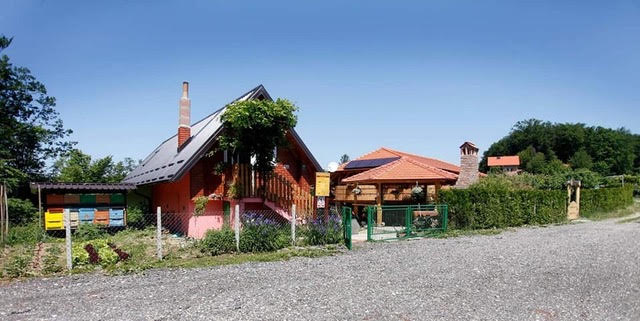
(The house that bees built: OPG Franić started in a small shack near their present location in Cerje Tužno, but with hard work and attention to the market for honey products, they have expanded their bee farm to include a local retreat and a tourist destination for people interested in the world of bees.)
“This has been a catastrophic year for bees, unlike any I have ever seen,” he warns. “Not just in Croatia, but worldwide.” Increasingly unpredictable and unstable weather wreaks havoc on the cycles of seasonal blooms that bees depend on. The health of the bees is in turn absolutely essential for the food supply we rely on. The increasing use of pesticides and herbicides encroach even in isolated farms. “If local bees can’t thrive,” Mr. Franić says, “neither can local agriculture.”
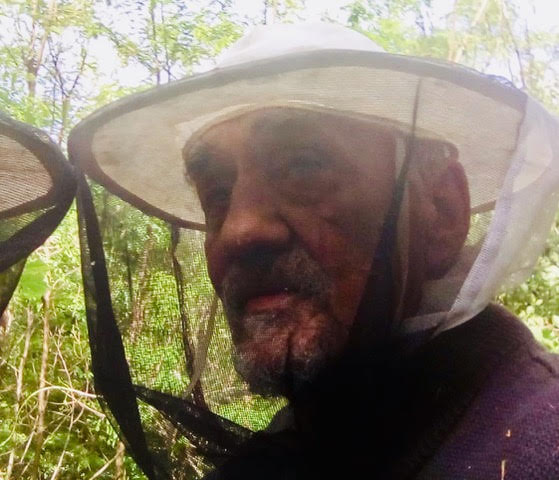
A similar disrupted cycle occurs in the marketplace: it’s difficult to sustain the scale of production necessary to make a living from honey, yet the market doesn’t favor small-scale local family farms. Unfair advantages of international trade add further obstacles to succeeding as a beekeeper. “Local honey is always the best option for consumers, and of course it’s important to support our local ecosystem, yet the European Union is a net importer of honey. We can buy all the honey from China we want, but without bees, without our bees, we’ll go hungry. This year,” he adds, “I worry that the bees won’t have enough even for themselves. We have to support them.”
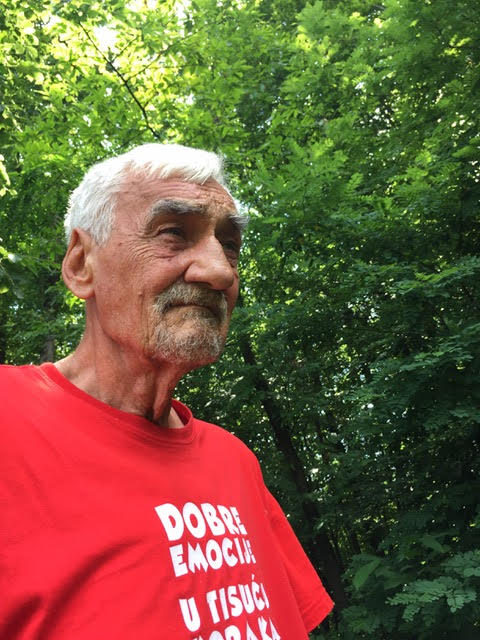
(“In forty years of beekeeping, I’ve never seen such a difficult season for bees,” warns Mirko Franić. The weather is ever more unstable and unpredictable. Why does that matter? “The future of bees will be the future of all of us.”)
But even though bees are recognized for the essential role they play in the circle of life, and although their products (including honey, propolis, royal jelly) provide both food and medicine for people, the situation gets worse every year. Many people push back against this trend: there’s an increasing interest in sustainable agriculture and promoting harmonious relationships with the natural world. Varaždin County, for example, features a variety of ecotourist destinations to visitors, and the Franić family farm is one along the route.
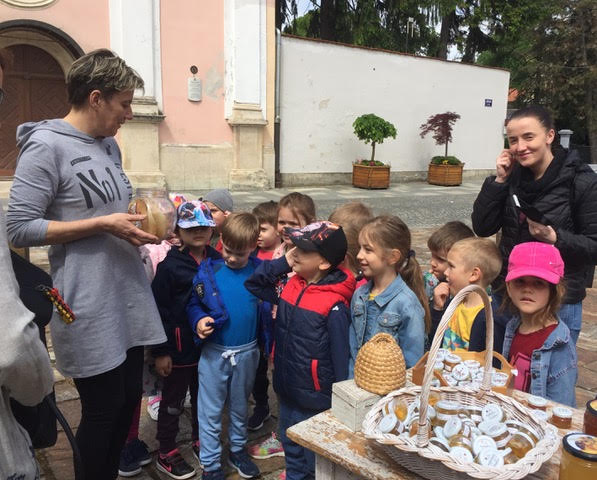
(Passing on knowledge of bees and awareness of their important role is an important part of the values of OPG Franić. Snježana Franić, from her year-round stand in Varaždin, shows schoolchildren an example of honeycomb, so they can see how bees build their homes and where they store their honey.)
“People eventually will return to many of the traditional ways of life, they won’t have a choice.” Mr. Franić predicts. “In the meantime, it’s important to protect the sources of our sustenance and to increase people’s awareness of the natural world. It is our responsibility to pass traditional knowledge to future generations.”
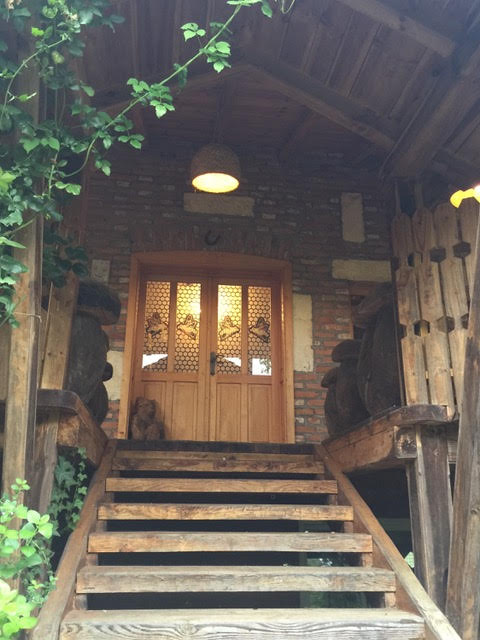
(Through these doors visitors can enter into the life of beekeeping and sample their products.)
With a bit of entrepreneurial ingenuity, Mirko Franić has found a unique way forward, entwining another Croatian tradition with the tradition of the family farm: he makes rakija from his honey. Šlivovica, of course, which is poorly translated into plum brandy, is one of the most basic rituals of Croatian culture, and one of the first traditions that visitors discover in Croatia. People then hear about medica, which is šlivovica with honey added.
“There’s a big difference between medica and medena rakija,” Mirko is careful to point out. “Rakija is usually made with plums or other fruit. It has a strong, sharp taste.”
Medena rakija, on the other hand, is a liquor made straight from honey, and only from honey. It retains the beautiful gold color and sweet smooth taste. The alcohol content ranges between 20 and 30%, depending on the batch, and consistently exceeds all standards for quality. Mr. Franić owns the copyright for his recipe, and Medena Rakija is the brand name of the leading product of O.P.G. Franić. It therefore has the special status of being both a unique and original product, and at the same time a part of a long and proud tradition of Croatian spirits.
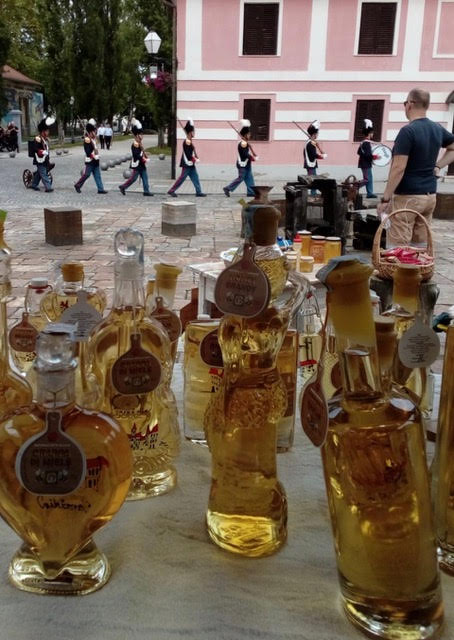
(The Franić stand on the Trg Tradicialna Obrta, in the Old Town, is just one of many Varaždin tourist offerings, selling its locally produced honey products in the shadow of the Ursuline convent.)
As of 2008, the family expanded the farm to include a beautiful retreat in the small village of Cerje Tužno, 14k outside of Varaždin, near the border with Slovenia. There he keeps his hives, extracts the honey, and makes the rakija. The grounds are groomed so that there is always something in bloom to interest the bees. There is also a lovely chalet designed to welcome both locals and newcomers to Croatia, able to accommodate tour buses or to rent for private parties and special events.
His greatest pride is in knowing he has offered consistent excellence while honoring a sense of responsibility to the natural world. “I will never compromise on the quality,” says Mr. Franić, “and my customers know that.” As proof, he passes his hand over an impressive display of medals, plaques and prizes. Through the years, the business he created has gathered more than 300 awards for the quality of his honey, honey brandy and honey products, including another novelty for many people: honey vinegar.
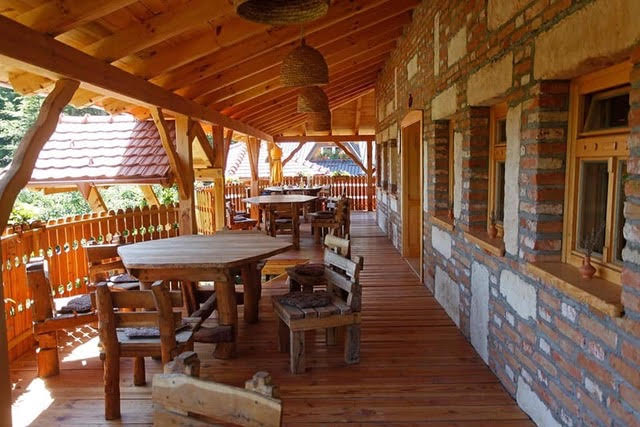
(Groups of up to 80 people are welcome to visit the bee farm and sample the honey products, and to enjoy peace, quiet, and some good company at the outdoor terrace and barbecue.)
He first started the business with his late wife, Slavica, and it is now managed by his daughter, Snježana, who is a familiar sight at their permanent stand on the Trg Tradicialna Obrta in Varaždin. Their rakija is sold in a diverse assortment of bottles and when the sun shines on the booth, or at dusk when she switches the overhead light on, they glow with a golden light. She paints the bottles by hand with street scenes of Varaždin and other images. School children who pass through the square on class outings buy miniature jars of honey, which she personalizes for them with a practiced hand. She has honeycomb always within reach which she is happy to show them, providing a mini-lesson on one of the most fascinating processes in the natural world. Travelers buy these honey products as charming souvenirs of Croatian-made products. And so OPG Franić interweaves yet another essential Croatian tradition: tourism.
Snježana shares her father’s absolute confidence in the quality of their products. “We always offer a taste of rakija to people who visit our booth,” she says as she draws a sample from the thermos behind the counter. “All they have to do is try it. When people taste it, they want it. They realize immediately it is something special.” They have a solid base of return customers throughout Croatia, and many from abroad who have been known to travel far out of their way just to replenish their supply of Medena Rakija.
Although Mr. Franić has found a way to make the most of his honey and create a solid business, the future, he emphasizes, is not secure. “It’s not a question of where people will buy their honey for tea, or propolis for mosquito bites. What happens to the bees will happen to us. The balance of nature is at stake. This is a question of survival.”
You can learn more about OPG Franic and watch their promo video on the official website.


